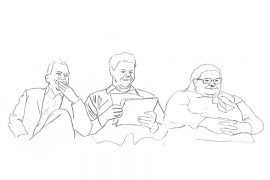The temperature was something nearing zero in Iowa. There was little snow, but what had landed wouldn’t melt or disappear, liquifying so slightly over sunny mornings and freezing again in the colder night, harder and more intractably placed than it had been before. The bitter wind kept the streets empty and as the most important election at the end of America approached, no one wanted to speak.
The only people walking the ice crusted sidewalks were the fanatical cohort of volunteers whipping the working class of the state into a frenzy for a socialist candidate. I was one of them, traveling over a thousand miles in service of the cause, though admittedly one I found myself less invested in than my rabid fellow travelers.
There are a few alternatives for building a mass movement of the disenfranchised, and if nothing else, Senator Sanders seems ceaselessly dedicated to his brand of economic justice. So, lest I face the unbearable weight of wondering if I had done enough to help people, I packed a suitcase and my warmest coat and boarded a plane bound for Des Moines.
Anyone can feel it, right? The explosive tension? When you turn on the news or talk about politics, that inexorable sense that something somewhere is going to have to give way very soon?
I am entranced by the viscerality of political obliteration. I doubt I’m alone in this. It seems the advocacy of totalizing destruction has taken on a new birth of life in the early years of this American century. There is an incredible allure to the language or thought of a violent and total deconstruction. Demolition as a form of dissolution.
The drive to obliterate is the raw emotional pull at the heart of the populist surge in American politics. Talking to voters in Iowa, where I went to canvass for Bernie Sanders this February, I recognized this pull as nearly identical to the ones in many other places—speaking to voters in person in West Linn, Tigard, Seattle, Portland, and Lake Oswego, or over the phone as far away as Michigan, Hawaii, or England, was similar to what I found in Iowa.
This yearning for liberatory destruction is simultaneously obvious and irrational. For that reason, the political establishment and pundit classes have struggled to accurately identify the source of this ferocious anger.
Here, I hope, through example, I might be able to organize something approaching a coherent analysis of the global phenomena of polarization, and express the material and historical base for the radical rejection of the status quo.
I’ve always preferred canvassing apartment complexes. Part of this is rank partisanship: I am a hard-left ideologue and I find something about the experience of living in an apartment creates a natural proclivity towards the socialism I advocate for. Some of it is blind self-interest: Apartments are warmer and further out of the rain, the doors are close together and easier to reach.
On this, the second of my door-knocking days, I had been sent to a complex of sorts. The buildings were identical rectangular brick blocks of two floors, one buried partially under the ground. I pulled my scarf over my chapped lips and shuffled through the doors.
The vast majority of people ignore you when you’re holding a clipboard. Nothing good ever comes from people with clipboards. They either want to sell you something you don’t want or charge you some price you can’t pay.
As it happened, the first person here didn’t ignore me.
They were hardline Bernie Sanders supporters. Hidden in the back corner of the building, they had a yard sign triumphantly taped to their door and a plan to walk out in protest if Sanders did not meet the caucus threshold. A woman and her husband in their sixties, they were the irrepressible core of the American socialist movement. Sanders has lost significant support from his 2016 run, but this immovable block of 15% of the party has stayed steady through an otherwise irregular and unpredictable primary.
Unlike Sanders’s wide popularity with younger voters, this couple represents a much more immovable base of support. Committed and proudly radical, they are the real socialist base, like the kind that once existed in Italy or France in the post-war years. They are a new equation to the American electorate. Small in number, but genuine and here to stay, they will outlast Sanders and will likely continue to represent a thorn in the side of the Democratic establishment for decades to come.
These are voters who have experienced and reacted to economic decay in exactly the way left-wing theory might have predicted. They have seen capitalism collapse and concluded that socialism is the answer. Their wages are stagnant, their living conditions are worsening; they support reform for their material interests.
If the trend of the 2010s was toward desecration of political norms and traditions, eventually evolving into a call for their obliteration, then the Sanders working class base is easily understood. They see the system taking away their rights, jobs, health, and healthcare and conclude with a desire to destroy it.
Democratic politicians have largely met this anger with bafflement and the insistence that the two parties come together along conservative lines. This coming together results in a compromise that further entrenches the U.S. in a system that supports the maintenance and encouragement of relentlessly competitive and deregulated capitalism. In a system that endlessly pursues profit, the natural condition is the degradation of the working class. Profits are raised and those profits are invested to achieve greater profits and those profits are achieved by lowering wages and raising prices.
As we have seen in the past twelve years, an economic crisis coupled with increasing inequality and declining standards of living and life expectancy result in loss of faith in the system. If these voters are the kernel of some leftist resurgence, they are an ill-equipped and uninspiring revolutionary army.
Sanders’ base of genuinely committed supporters is optimistically a few million, and the actual activist socialist base surely tops out at less than 100,000. The socialist movement is one aspect of the emerging American political structure. Where they will go and whether they will have lasting impact depends greatly on the actions of the rest of the country and, most importantly, the rest of the working class.

Temperatures in Des Moines were often in single digits. Bernie canvassers gather for a photograph before making their rounds. All photographs provided by Wallace Milner
I stumbled out into the bracing cold, having been ignored by two other residents. The thing about cold, I’ve gathered, is that it operates as a much more solid thing below a certain point.
I’ve lived all my life in Oregon, never touched a set of skis or a snowboard. I don’t go up the mountains or on winter trips north. Before I went to Iowa, I’d never been in weather below 20 degrees. The day before I left, I lost my scarf. It was supplanted by one I had bought at a Portland Timbers game and hung on the wall. It was now the only thing giving feeling to my face.
The doors in this apartment complex didn’t close properly. They hung open and some of the heat escaped. After a few doors you get used to the cold. Your body tenses up, like before jumping into a lake. You put on your hat and pull your scarf tighter and try to shrink down as best you can.
Outside in the courtyard, there was a shopping cart. It was frozen over with a blanket and an empty box of Fanta in it. Two things I learned about Iowa, there’s more soda and less places to recycle cans than in Oregon.
The next sets of apartments I hit were mostly empty. If people were home, the occupant I was looking for had moved, or the answers were curt and noncommittal. Perhaps five sets of apartments passed before my next answer.
I asked as always if they had considered supporting Bernie Sanders in the upcoming caucus. He was a blonde man, in his late forties, with sad sunken eyes and a scraggly beard. He was very kind and looked down at the floor as he beat around the answer. “It’s okay if you don’t support him right now, I’m always happy to answer questions about policy or…,” I offered. He looked up.
“Nah, I’m all in for Trump.”
I paused for a moment, taken aback. I try to impose the rationality of theories on an electorate that has no such desire. The voters I had been sent to canvass were selected specifically because they were likely to vote for Sanders. In this case, the man had been included because in 2016, he had voted for him in the Democratic caucus. In my moment of stumbling through my surprise, I muttered “that’s okay,” and the man wished me well as he closed the door.
I wished that I had done my job and followed the script. I would have loved to ask him questions on why he had been drawn to the right. What had tempted him from his early support for Sanders? In my arrogance, I was unprepared for the idea that someone might one day consider democratic socialism and the next economic nationalism.
American voters do not operate along a careful left-right axis as we might like to think. They bounce around seemingly at random. They prioritize unusual things. They love and hate unexpected people.
Though I didn’t talk to him for any length of time, I am familiar with this type of voter more broadly. They are shy, poor Trump supporters. I’ve met many of them knocking doors. They are very polite and don’t like to talk about politics. They will never insult you or aggressively disagree with you. When you leave, they will say something nice.
There is no sense in simplifying or in trying to justify this sort of voter’s thinking. They are probably not particularly evil people, but they will gladly support policies that will hurt many thousands of people.
These are not foolish people. Not any more than any other voter. They aren’t criminals, they certainly aren’t whatever illusions of backwards country rednecks liberals like to imagine.
Some of them are incredibly rich. Many more are petit-bourgeois small-business owners. Many are in “respectable” society. Most are just beneath it, in the American middle class, where illusions of self-sufficiency have festered and grown into a distrust of supposed freeloaders.
They are bitter and resentful of a liberal upper class they perceive as snide and smug, hateful of the constant pressure of a supposed “political correctness” they are never asked to adhere to, and frothing with rage at a system that has offered them relative privilege.
The logic of liberal capitalism tells us we live in a meritocracy. The best rise to the top and if you aren’t at the top, there is something wrong with you. For the vast swathes of Americans who see their standard of living sliding backward, there is a horrible guilt and shame. The right does away with that. It offers a sense of identity and an enemy to blame, a pride to feel and a victory to have.
The classic socialist argument is that these lower income voters who have been swayed by Trump can be won back by the promise of economic equality. By shifting blame from immigrants to bankers and CEOs, the working class can by won over more fully. Combined with an upsurge in turnout from the disaffected and young, a winning coalition can be built.
I have my doubts. Low American voter turnout rates are quite static and partisanship similarly inelastic. But it seems to me the only real chance we have.
I sometimes wonder though, for the voters who are with Trump all the way, what is the end goal?
In a country where faith with government seems irreparably destroyed, a transformation of society seems inevitable. But what would that be, really? What is Trumpism? Empty promises of anti-corruption and vague, spasmodic bursts of nationalism? It seems unlikely to offer a long-term abatement. No, the material conditions of Americans will not be altered unless the basic form of American industry and economics is. And if the country doesn’t come into the hands of workers or some violent corporatist regime, the present pattern will continue.
The crisis of capitalism must somehow be resolved. As inequality persists and the pressure on the middle class increases, the divide between the top and the bottom will turn into a chasm. Climate change will bring surges of refugees and economic catastrophe.
Perhaps the pressure will force us to rebuild, to create stronger communities of mutual aid and solidarity. Perhaps it will advance consciousness and humanity and drive us to form a more equal nation. But it seems equally likely to do the reverse.
I stepped outside and saw a man shivering as he tried to start his car. The mirror was held on with tape.

Volunteers used their homes as bases for campaign operations, such as this one, outside of Des Moines, Iowa.
I’ve loved cats since I was a young boy, always more than the cats loved me. They mean more to me than almost anything and I’ve been around them my whole life.
One of my greatest fears canvassing is that I will accidentally let someone’s cat out when they talk to me. It’s an irrational worry, it just nags at the back of my mind.
So when a family at the next apartment I arrived at asked me to step inside so they could talk without their cat leaving, I didn’t consider rejecting it at all. This happens sometimes, that people will invite you in. We’re warned not to accept invitations, but I always forget. Besides, I’d rather go through life trusting people if I could.
Inside this house was a family that hated “illegal” immigrants and Elizabeth Warren. These were two of the first things they told me, and they did their best to sell it in the careful and inoffensive language of American liberalism. This anxiety, I’ve often found, is as revealing as anything that’s said at all.
These people were the sort of half-engaged voter I often find, with a predisposition towards Sanders’s honesty but a fear of his radicalism.
I did my best to convince them to support Bernie by talking about how much they hate their landlord. The regular crass class war offerings you hear condemned in the pages of the Washington Post. I am from a liberal and upper-crust background, and I feel queasy and hypocritical saying these lines, even if I believe them.
The people I spoke to were drinking, each out of their own two-liter soda bottles, when they invited me into their house. Two men and a woman sat around a table playing a card game, Magic the Gathering or something like it.
There was a man and his wife, and someone he described as his “adopted brother.” The man I think was the most attuned to politics, he was a little out of touch and held some confusing or retrograde views, but was oddly in tune with opinions of the middle class, who he hated. He summed up their ideas better perhaps than many of them can themselves. The middle class, he said confidently and interrupting his wife, are afraid of Bernie Sanders because they think the system works for everyone. It does not, he added.
They talked about their home, it was decades old, they said, and their rent was raised recently by over $100 a month. The man said he was unable to get a job because of his weight and past firings. He stressed that his behavior had been warranted, an overreaction but nothing deserving permanent unemployment. The woman was on disability.
One year their apartment flooded. The landlord said to get everyone onto the bed and wait for a day. They lost $500 worth of cards for the game they played, which seemed to be the biggest part of their lives.
The man’s parents were well off. He said they didn’t understand the system wasn’t working for people. He liked Bernie but was too clever to sway easily. The woman wasn’t as familiar with current events. I probably could have convinced her to vote for Sanders on her own. She just wanted disability protected. Those are the sort of people I most like to talk to. They have a problem because of inequality. You can empower them by calling on them to join the fight against the system that hurts them.
The man said when the sewage gets clogged, the landlord won’t fix it. Sometimes it floods the house. The heat doesn’t work and they all sit around in blankets.
The man said in 2016 he went to the caucuses and gave a speech. Someone complimented him on it. He was very proud. I don’t blame him. I would be too.
For these millions of Americans living at the edge of exploitation, there is a new kind of suffering. They are not obliterated by the process of creating excess profit, they are controlled by it. Like a parasite, working its way into the psyche of the American the all encompassing drive of material production and warping how we engage with and see the world.
These people are not the suffering factory men of Sinclair or the starving farmers of Steinbeck. They are the victims of an economic machination they can’t see, couldn’t possibly be expected to see. They are tortured by a vast process of economic development that encompasses every aspect of their lives. They are stripped of their dignity and humanity, useful only so far as they provide for that awful system that exploits them and offers them nothing.
The experience of the American worker is no longer one of desperate unrewarded toil, nor is it that lie of dream and reward. It is instead nauseated unfulfillment coupled with a crippling powerlessness. Far from creating class consciousness, this suffering alienation serves at once to overwhelm and undermine all social movements. There is an increasing sense that social cohesiveness itself is dissolving.
I’m unsure if voting is powerful enough. For change to happen the vast and suffering mass must be compelled on their own terms to take action. To call into question the systems they prop up. To end the tyranny of rent, rent must not be paid. To improve the lives of workers, power must be taken into the hands of the producing class.
There is the vaguest of outlines of some real and dramatic change in this country. It’s scarcely perceptible but it illustrates itself in the fissures appearing in the structures of liberal hierarchy. People are hurting. They are hurting, they are terrified, and they are unsure of how the future might develop.
There is no confusion of Trump’s victory here. This family understands it on a level imperceptible to someone like me. They try to explain. He convinced people to blame immigrants.
I understand on some surface level. But the people living in these worsening conditions really understand it. They understand how repulsively emasculating it is to have to beg in order to stay in your home. How this shame drives voters to rage.
They see the breakdown of things. It dawns on me. For them it’s not a demolition they want. To them, this whole economic structure is coming down on its own.
Before I leave the man tells me the walls are filled with cockroaches. I try not to look awkward. I am afraid of bugs. It shows.
“You probably don’t want to lean against the wall.”
I shift my weight from my right shoulder to my feet.
“Y’know this place, really, what they should do with it is just tear it down.”
He looks around his home.
“They should just take everybody out and burn the whole thing down.”

Illustration of Bernie Sanders by Josh Gates
For millions of Americans the idea of a better world is inconceivable. Their life is one of grim suffering and desperation to match a deadline for debt that can never be fulfilled. This is how they believe things will always be.
American communities have been devastated. And they look to their leaders and what are they told? “Things are better than ever!” “It’s only a skills gap.” “Maybe if you worked harder? Have you considered learning to code?”
Is it any wonder voters dream of escaping this in any way they can imagine? What difference is there between millionaires and Marxists if all they do is lie about making your life better?
Is it any surprise that so many give in? That they turn to radicalism or apathy?
This unruly mass sits like a keg of gunpowder. A huge swath of the country is unbought and undecided. They are checked into the political system, but disengaged by it.
They are not, as it is often framed, moderates. These voters bitterly detest both parties as liars and criminals. They represent a desperate and frustrated winning base.
Someday, someone is going to win too many of these voters. It might be Sanders, or may have already been Trump. It might be someone waiting on the horizon. The delicate balance of the American party structure is going to break, rapidly. A politician or movement will leverage the apathetic and disenchanted as a real political movement, the sort we haven’t seen in America. Motivated, mobilized, and wielding its power to gain more power.
The question is not whether the system will fail. It already has. The demolition is upon us and the old order is cracking and crumbling under the strain. The future, with declining profits and growing inequality, with greater wars and greater crisis can only bring greater change.
We’ve been taught that nothing can change. But there is an arrogance and an ignorance to this. Things must change. They always do. All that is solid melts to air. The question is not if this delicate balance of American power will end. It is how. Whether we will have the courage to take apart what has failed before it collapses under its own weight. Whether we can summon the strength and create the mass movement to reorganize all fields of production towards the common good, whether people can be compelled to understand their common interests and their shared suffering. And if we can take into our grasp the rights that should have always been guaranteed. Whether we can change before it is too late, and build a better world from the ashes of the old.

Senator Sanders meets with volunteers after his speech at the State Historical Museum of Iowa.
Main image: Traveling members of Portland Democratic Socialists of America gather at the Ankeny, Iowa field office before a day of canvassing





